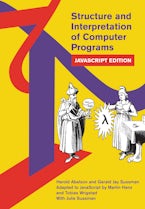MIT Electrical Engineering and Computer Science
Structure and Interpretation of Computer Programs, second edition 
Paperback
$75.00
Paperback
ISBN: 9780262510875
Pub date: July 25, 1996
Publisher: The MIT Press
684 pp., 6 x 9 in,
Hardcover
$86.00
Hardcover
ISBN: 9780262011532
Pub date: July 25, 1996
Publisher: The MIT Press
684 pp., 6 x 9 in,
eTextbook rental
4 Months: $43.00
12 Months: $60.20
eTextbook
ISBN: 9780262510875
Pub date: July 25, 1996
Publisher: The MIT Press
684 pp., 6 x 9 in,
684 pp., 6 x 9 in,
- Paperback
- 9780262510875
- Published: July 1996
- Publisher: The MIT Press
$75.00
- Hardcover
- 9780262011532
- Published: July 1996
- Publisher: The MIT Press
$86.00




